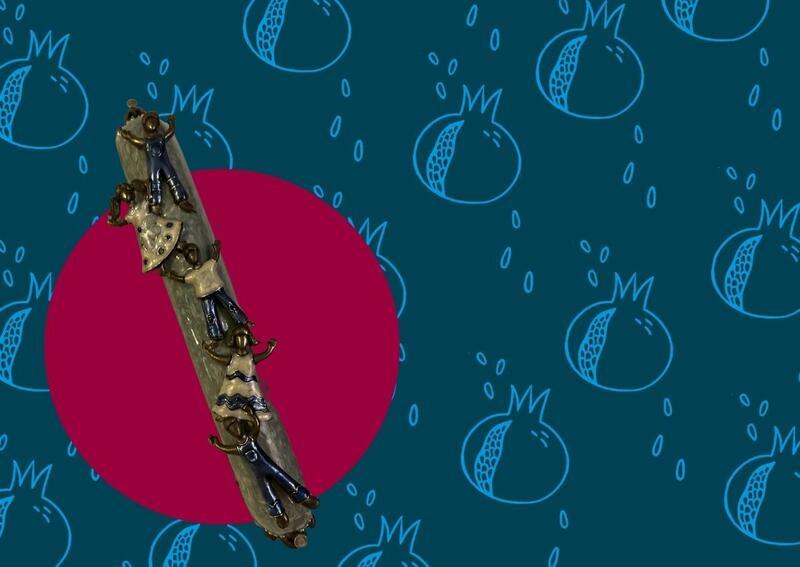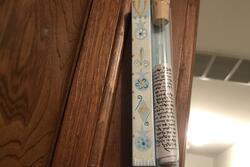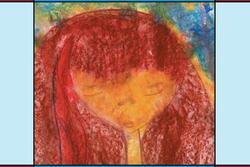My Mezuzah is a Symbol of Feminist Welcoming and Protection
I associate mezuzot with the concept of protection, and therefore with Jewish feminism. Creating spaces where everyone feels safe to be themselves should be an important component of both activist and faith-based communities, and I see it as a big part of Jewish feminism for that reason. The biblical verse that describes the mezuzah appears in Deuteronomy, and has been subject to countless interpretations throughout the centuries. Because I see mezuzot as emblematic of Jewish feminism, I have to wonder: Do these interpretations paint the mezuzah as a part of Jewish feminism too?
My first round of research on mezuzot yielded surprisingly disappointing results. The rules regarding the mezuzah seemed to overwhelm its function and almost every act involving the mezuzah was geared towards men: only men could write mezuzah scrolls, only men could hang the mezuzah, and the only relationship the mezuzah had to women, according to Professor Elizabeth Shanks Alexander, a Judaic studies professor at the University of Virginia, was to “secure their place of domicile: under a Jewish male householder.” I was upset by how blatantly exclusive these rules are. Then, I discovered Professor Alexander’s article, “Ritual on the Threshold: Mezuzah and the Crafting of Domestic and Civic Space,” and, as a result, Philo.
Since reading this article, Philo has become one of my favorite Jewish thinkers. Philo lived in Alexandria in the first century CE and he, unlike many rabbis from the first and second century CE, believed the mezuzah was meant to be on the outermost part of the house so that it was visible from the street (or, if you had a gate or a fence, it should instead hang there.) He wanted the mezuzah to proudly take up space; he believed that the mezuzah should be as public as a statue in order to widely spread its inscribed principles of justice. According to Professor Alexander, Philo’s ideas opened the door to seeing the mezuzah as a feminist item, as he believed the mitzvah of the mezuzah was viewing them, not hanging them or writing their contents. This emphasis on viewing, rather than creating, enables women to take part in the mitzvah.
The mezuzah represents my identity as a Jewish feminist because of its emphasis on the act of welcoming. By hanging the mezuzah on the outside of our doorposts, we can essentially advertise a safe space for anyone seeking refuge—just as the broader movements of Judaism and feminism are supposed to. Mezuzot mark a home as protected. With the mezuzah, Jews can “claim” space as our own. As a good luck charm, the mezuzah has brought safety and G-dly presence to so many Jewish homes. It's essential that welcoming doesn’t become a forgotten virtue. After all, activism is not just about rallying; activism is also about creating lasting change that helps communities, which is especially important during the pandemic.
One of the most important values of Judaism to me is shared connection. Whether with my community, my congregation, my ancestors, my family, my camp, or my friends, these connections are big parts of what make people Jewish. It’s why I value traditions; they connect past, present, and future Jews who have all participated or will participate in the same activities. The mitzvah of mezuzah connects my home not only to houses in the ancient streets of Alexandria where Philo lived, or to the generations of future Jews who will proudly display their mezuzot on their own doorposts, but also to the large web of Jewish homes with mezuzot in 2021.
The mezuzah has always felt like a bodyguard to me—protective and comforting. My family recently moved, and one of the first things we did at the new house was hang mezuzot together. The mezuzah that hangs outside my bedroom door is beautiful. It’s a long, thin, blue oval, with a chain of sculpted people holding onto each other to keep from falling off the little piece of ceramic.
Last summer, at Camp Ramah in the Rockies, a deer died on camp grounds. Rather than getting rid of the deer’s body, the camp leaders decided to elevate its holiness by turning some of the animal’s skin into a scroll for a mezuzah. I helped prepare the skin to dry, assisting in the mitzvah of making a mezuzah. I felt honored to be a part of such a time-honored tradition, especially one in which so many Jewish women historically couldn’t participate. (Although I must admit that handling the deer’s skin was pretty disgusting.)
Philo has helped me realize that a mezuzah is a time-traveling object that connects me to Jewish women thousands of years ago, who kissed their own mezuzot as they passed through their doors. My mezuzah is a shield, guarding my space from anger and hurt. My mezuzah is a guide, a constant reminder of the principles of justice. My mezuzah is a mitzvah. Most of all, my mezuzah represents my pride—in Judaism, in feminism, and in myself.
This piece was written as part of JWA’s Rising Voices Fellowship.








Why did you take the “o” from Godly?
I inherited my home from my father, who moved into this little house after my mother passed away. One of the first things he did was affix a beautiful mezuzah to the doorpost. I've kept it there with love for more than a decade, now, until last week. The terror of recent events caused by Hamas and the rising flood of antisemitism frightened me enough to remove it from the outside. These are dangerous times, and strangers come to my door all the time. I hope to be able to re-affix it someday when it feels safer to do so. But for now, my heart is broken. For the victims. For the state of the world. And for my own little home.
In reply to I inherited my home from my… by Beth
6/30/2024
My Dearest Beth,
It pains me that you are being consumed by so much fear, terror & insecurity, especially in your OWN home. Everyone's home should be & must be their own sanctuary. (The diverse & deeply spiritual meaning of
"sanctuary" is not lost on me.) ~~ Have you considered hanging mezuzot on all your doorposts INSIDE your home? They would be hidden from the eyes of dangerous strangers but visible, warm, welcoming & reassuring to you, your family & your loved ones. ~~ For 70 years now Ive never pronounced & wished Shalom to anyone more ferverently than I do to you, dear Beth. ✡️🕎
PS: I am a Roman/Latin Rite Catholic Christian who has had a life-long deep love & respect for the Jewish ppl & their faith, beliefs & traditions. Their amazing ability to land on their feet & survive whatever unspeakable horror they are been subjected to continues to deeply humble me. For so many reasons I've had a mezuzah on my front doorsill (my family's term) for decades now. And, yes, I hung it myself w/o the aid of a man.
As a human being in a relationship with ALMIGHTY GOD, my only concern is what GOD thinks. One day we will all stand before him and take our lives into account. You and I will not have the luxury to blame Philo or any other favorite influencer in our lives if they have led us away from the Spirit and Truth of GOD. You had better make VERY sure you are right about who you allow to influence you for only you will be held accountable for your actions. And are your actions and thoughts influencing others away from the Truth of GOD! Just because you think it doesn’t make it right or true. Only GOD is right and true….
My feelings about women & Judaisom is that in the past, men were elevated and women were only important to propagate the Jewish population, to cook, care for the sick, & were subjugated to the wishes of h1er husband. It was the situation where the female walked 10 steps behind the male. Of course, now, in the
21st Century, that sort of thinking is Rejected. Women are recognized as being of value not only for their housekeeping skills and childbearing, but for their intelligence and are being
recognized as equal to men. Even to the point where they are now
Rabbis and Cantors in Synagogues. So phenomenal changes have taken place in the Jewish religious practices. There may be some resistance to the "modernization" by the Orthodox practicing Jews, but there is now a section called, Modern Orthodox, which has relented some of those strict practices. I, personally, do agree with Progress and the
Modernization Movement. Women shoul be allowed to sit next to her husband in a synagogue and pray together. This is 2023 and the discrimination of women in so many facets of society must be eliminated!
While mezuzos written by women according to most poskim are not kosher this is related to tefillin. However אSince it is not a time bound commandment women are 100% required to have mezuzos on their doors, and they may (and under some circumstances should) affix the mezuzos.
It's a Jewish talisman.
I now understand its purpose as I have wondered it's meaning on various places(doorways) I visit.
Mezuzah was our family’s answer to the death angel unknown epidemic as of spring 2020. It tied back to us in ways out of our control or sphere of influence bc fight or flight are normal response. Mitzvah expressions are the epitome we can do. The steps Ancients made pathway for decisions. Decisions; male/female our steps; now.
Amazingly written! I never knew about that side of the history of the mezuzah!
Beautifully written commentary. We moved my mother to a skilled nursing facility this weekend and I had the honor of hanging her mezuzah on her doorpost. Reading this today makes that action even more meaningful to me. Thank you!